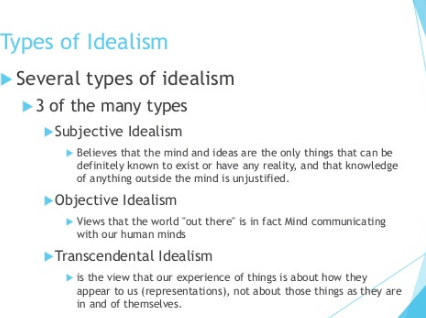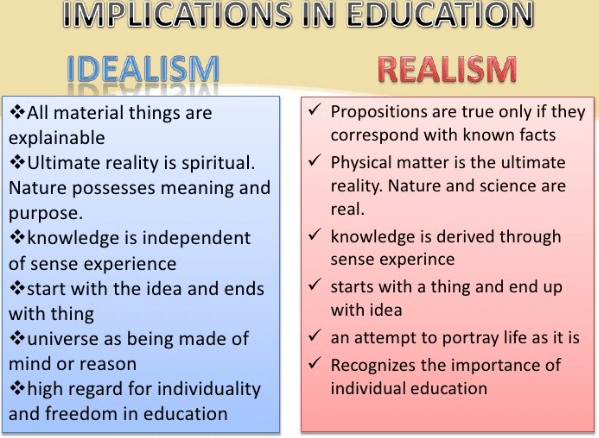Idealism in Education
Table of Contents
The word “idealism” may be derived from “ideals” or “ideas”. So according to idealism higher values are much more important in human life than human life else. This philosophy seeks to make clear man and the universe in terms of the spirit of mind.
It takes its due from the philosophy of ideas, involved by Plato, the greatest philosopher of all ages.
Try This:
- Magic Call Mod APK
- AV Night Latest APK
- What is Organization?
- Four Conditions For Deadlock
- Types of System Call With Their Functions
- Process States & Its Attributes
Idealism Definition
- According to D.M Dutta, “idealism claims that vital reality is spiritualism.”
- According to J.S Ross, “idealistic philosophy acquires many and diverse forms, but the claim underlies all this that mind or spirits are the essential world stuff. The true reality is a mental character”.
- According to Horn, “An idealistic philosophy of education is a version of a man finding himself as an essential part of the universe of mind”.
- According to Brubacher, “idealists point out that it is the mind that is central in understanding the world to them nothing gives a greater sense of reality than the activity of the mind engaged in trying to comprehend its world. For anything to give a greater sense of reality would be a contradiction in terms because to know anything more real than mind would itself be a conception of mind ”.
Types Of Idealism

Chief Assertions
The following are the chief assertions of idealism:
- Ultimate reality is mental or spiritual in nature: the material world is nothing more than an outward sign of ultimate reality.
- The material world is mortal and changing: the ultimate reality which consists of ideals and values is eternal and unchanging.
- On this basis, the body is false and mortal; the soul is true, immortal.
- Man is essentially a spiritual being: and his spirituality distinguishes him from animals. His spirit alone enables him to control his environment.
- Man is a free agent: free in the choice of his ends and means to realize them:
- Values are pre-existing, vital, and unchanging: man cannot create values, but the aim of life is the realization of vital values- Truth, beauty, and goodness for their own sake.
- Highest knowledge: spiritual reality, Brahma, Gyan, is the highest knowledge.
- The fullest development of personality: idealists believe in the fullest development of the personality of an individual. According to them, the development of personality means the achievement of perfection.
Idealism has great concern with the following:
Idealism In Education
The aims may be stated as under:
Exaltation of Human Personality: the exaltation of human personality is the major aim of education as contained in idealism. The exaltation of personality is based on the concept of realization of the highest potentialities of the self in a social and cultural environment.
Adams has given great importance to self-realization and the development of personality.
Universal Education: idealism believes in the concept of a universal rate of man. Education, according to idealism, should be based on the teaching of universal truth that is, men belonging to different races carry in them the same delightful glow.
Enrichment of Cultural Environment: idealism regards education as a means to the enrichment of the cultural environment. According to Rusk, “cultural environment is an environment of man’s own making.
The aim of idealistic education is preservation as well as enrichment of culture. Education must contribute to the development of culture, enlarging the boundaries of spiritual realism. ”
Cultivation of Moral Values: man is essentially a moral being idealism requires that moral, intellectual, and aesthetic aspects of his personality should be promoted idealistic education in phase’s characters- building and character formation.
Curriculum:
Idealism believes that the goal of human life is the exaltation of man’s personality. Education has to achieve this aim. The school curriculum, accordingly, consists of those subjects which are conducive to this goal.
The curriculum must reflect the capitalized knowledge and experience of the race. So it must primarily consist of “humanities” or “cultural studies”.
Plato Idealism
Plato, a great promoter of idealism, conceives of the curriculum from the point of view of ideas. He believes that the highest ideal of life was the attainment of the highest good or God, hence, the curriculum ought to impart inherent values in order to enable the educand to attain his highest good.
The inherent or spiritual values, according to him, are truth, beauty, and goodness. These three values determine three types of activities, intellectual, aesthetic, and moral. Each type of activity is represented by studies and should form a part of the curriculum.
Intellectual activities are represented by subjects like languages, literature, science, mathematics, history, and geography; aesthetic activities will be possible through the study of art and poetry and moral activities through the study of religion, ethics, and metaphysics.
Ross talks of two types of activities which would be represented by physical activities and spiritual activities. Physical activities draw our attention to such subjects as health and hygiene and two subjects that foster bodily skills such as gymnastics and athletics.
Hence such subjects as history, geography, languages, fine arts, morality, religion, science mathematics, and others be included in the curriculum.
Idealism Vs Realism

Methods of Teaching:
Idealism has exercised more influence on the aims and objects of education than on methods of teaching. It speaks to the general nature of teaching methods. The great Greek idealist Plato, however, advocated Socratis method-dialectics.
Many educational philosophers advocated many other methods the deductive method, the inductive method, the analyst’s method, and so on. Idealism is not much concerned with the choice of methods so long as its essential objective is fulfilled.
Which is the enrichment of the personality of the public? Idealism lays stress on instruction, activity, and experience. The word‘ instruction’ implies sympathetic guidance by the teacher.
Another factor that idealism emphasizes in the method of teaching is an activity or learning by doing. The normal child should learn through activity. Idealism does not decry questioning discussion and lecture methods of teaching.
But it extols the method and spontaneous mental activity. It does so because creative activity leads to self-expression and realization of the highest potentialities of the child. Experience has a significant place in the idealistic method of teaching.
The truly educative acts are those which go on within the experiences of the learner and comprise the student’s own self-activity. The duty teacher is to develop in him, insight into duped experiences that he already possesses.
In addition to it, the teacher should endeavor to unfold his potentialities by providing him with stimulating experiences. In short, the essence of the idealistic method of activity and freedom is regulated and guided.
What Is a Teacher?
The naturalist would do without the teacher at times. But the idealist does not belittle the importance of the teacher. In the idealistic system of education, the teacher is indispensable. The immature pupil not be expected to be able to understand by his own intelligence.
It is only under the enlightened advice and able guidance of some individuals of mature understanding and seasoned experience that the child can have such knowledge. Thus, according to the idealist, there can be no teaching without a teacher.
The immature learner can never be able to perfect his personality unless there is someone to teach him to methods of becoming perfect. The universe is a rational system in which the teacher forms one part and the pupil another.
The teacher is thus necessary for advising, directing, and even controlling the conduct of the pupil in order that he may be able to ensure the perfection of his personality. The idealist teacher can guide and help his pupils in three ways.
Firstly, he can influence them by his personality, i.e, by associating with them personally. Secondly, he can suggest questions and problems to them and encourage them to think for themselves.
Thirdly, he can enable them to understand the problems by following the scientific method of analysis and synthesis.
According to Ross, in the idealistic scheme of studies, the teacher is needed “to assist the educed, who is developing according to the laws of nature, to attain levels that would otherwise be denied him.”
According to idealism, education is a process in which “the educator as well as educed is working out his salvation.” The pupil is as much a necessity for the teacher as the teacher for the pupil.
Objectives Of Idealism
Idealists like to give freedom to children. But that will be qualified freedom. It should be for activity. Freedom does not mean a license or waywardness. It implies responsibilities. It should be regulated and guided freedom, restrained freedom.
The idealists’ emphases are on self-disciple. He believes that human behavior should have internal controls, rather, even such external controls as praise and punishment. Place violation in discipline is highly valued. Idealism believes in inner discipline.
Idealism advocates the cultivation of higher values of life through moral and religious instructions. It accepts restraint on freedom. It requires that teachers present good examples because the child considers the teacher to be an ideal person to be evaluated by his pupils.
Merits/ Contribution of Idealism
Idealism has contributed to modern educational thought and practice in the following way:
- Idealism emphasizes the complete development of human personality. It has resulted in a fresh look at human relations in teaching.
- Idealism recommends a happy blending of individual and social aims of education.
- It gives an important position to the teacher in the educative process. The teacher must perform the rule of a benevolent person who, like the gardener, is charged with the responsibility of rearing the flowers of humanity.
- The process of education must lead to the deepest spiritual insight and the highest moral and spiritual conduct.
- Idealism lays stress on self-realization.
- According to idealism, discipline is not to be imposed on pupils. The teacher has only to help them develop self-discipline and self-knowledge.
- The highest knowledge is that of self or that of divine, cosmic or spiritual life. That leads to freedom of mind.
- Simple living and high thinking should be the aim of education
- Idealistic philosophy restores men to their proper place and educational institutions become places for learning and creating values like truth, beauty, and goodness.
- Idealism has been supported by many great philosophers both of the east and the west. Many educational schemes and plans had their beginning in idealism.
Criticism Against Idealism
- It neglects the child’s psychological nature: it is alleged that it neglects the psychological nature of the child and is more inclined towards spiritualism. It also ignores the physical self.
- No significant contribution to methods: it does not contribute much to the field of methods of teaching. It de-emphasizes experience.
- Teacher: too much importance has been given to the teacher. A child grows under the shadow of a teacher. He is much dependent on the teacher and the established values.
- Social order: it may lead to a rigid and often totalitarian social order.
- Goals: it sets no obtainable goals there cannot be a final goal.
- Humanities overemphasized: the other points are that it emphasizes humanities. It under-rates the study of science and technology. It overlooks the possibility of error. Its truth is unchanging.
- It does of taking note of individual differences and special abilities of the pupil and subject them, one and all, the same course of studies.
- Idealistic scheme of education, by and large, pays less attention to the physical, industrial, social and electronic environment of today.